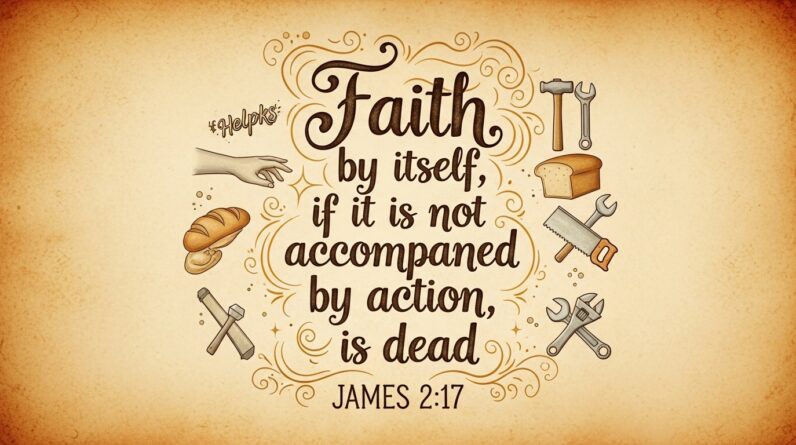Finding God’s Purpose In Your Struggles
You’re sitting in the middle of a storm right now — maybe it’s illness, relational pain, job loss, or a disappointment that keeps replaying in your mind. It feels personal, heavy, and sometimes unjust. You want answers, and you want relief. You also want meaning. The good news is that God doesn’t waste your pain. You can find God’s purpose in your struggles, and that truth will change how you live through trouble. This article will walk you through biblical truth, practical steps, and the refining metaphor of gold so you can see trials as opportunities for spiritual growth rather than meaningless suffering.
Why your struggle matters
When you go through difficulty, you might wonder if it matters to God or if it’s just random bad luck. The Bible is clear that nothing in your life is outside God’s attention and intent. Your suffering is not an accident that God couldn’t prevent; often it’s a field where he cultivates character, trust, and spiritual maturity in you. Understanding that your pain has purpose will shift your focus from simply escaping hardship to asking, “What is God doing in this?” and “How can I cooperate with him?” When you learn to look for God’s hand in the hard places, your life begins to reflect depth and hope.
The promise of Romans 8:28
One of the cornerstone promises for this truth is Romans 8:28. Read it and let it settle into your heart: Romans 8:28. It reassures you that in all things God works for the good of those who love him and are called according to his purpose. That doesn’t mean every event is good in itself, but God can weave every broken thread into a tapestry that serves his larger plan for you. When you trust that promise, you stop seeing God as a distant manager and start seeing him as an intimate craftsman who uses even your pain to shape you into someone more like Jesus.
Seeing trials as opportunities for spiritual growth
It’s easy to treat trials as interruptions, but Scripture invites you to view them as growth opportunities. James instructs you to consider it pure joy when you face trials because they produce perseverance, which leads to maturity (James 1:2-4). That’s a spiritual reframing, not a denial of pain. You don’t pretend the hurt doesn’t exist; instead, you choose a posture that asks, “How will this make me more steadfast, faithful, or compassionate?” When you adopt that posture consistently, you’ll begin to recognize God’s purpose in challenges as a pathway to deeper faith rather than mere hardship.
The refining fire metaphor
Think about gold. It’s valuable not because it’s easy to produce, but because it’s been refined. The refiner fires the gold, removes impurities, and leaves behind something purified and more precious. The Bible uses this image to describe what suffering does for your faith. 1 Peter 1:6-7 compares the testing of your faith to the refining of gold, showing that trials prove the genuineness of your faith and produce praise, glory, and honor at Christ’s revelation. When you see your pain through this metaphor, you stop asking only “Why me?” and begin asking “How is God refining me?” That shift helps you cooperate with the process instead of resisting it.

How God uses pain to shape character
Scripture repeatedly teaches that suffering produces character. Romans explains that suffering produces perseverance; perseverance produces character; and character produces hope (Romans 5:3-5). That doesn’t make suffering good in itself, but it shows God’s ability to transform pain into progress. Hebrews encourages you to recognize that discipline is painful at the moment but yields a harvest of righteousness (Hebrews 12:11). When you trust this process, you’ll begin to see God’s purpose in challenges as a training ground where patience, faith, and spiritual stamina are forged.
Practical steps to find God’s purpose in your struggles
Finding God’s purpose in the midst of pain isn’t just theological; it’s practical. You can take concrete steps to cooperate with God’s refining work and emerge stronger on the other side.
- Pray honestly and persistently; don’t hide your questions or anger.
- Reframe your story: instead of “Why did this happen to me?” ask “How can God use this?”
- Stay connected to a community that will mourn with you, pray for you, and speak truth into your life.
Each of these steps is actionable and rooted in biblical wisdom. Honest prayer keeps you vulnerable with God rather than isolated. Reframing prevents bitterness by inviting God into the narrative. Community gives you perspective and support so you’re not trying to do spiritual surgery alone. When you follow these steps, you begin to discover God’s purpose in challenges because you’re actively participating in how God is working in and through you.
How to pray through suffering
Prayer isn’t magic that makes pain disappear; it’s the lifeline that keeps you connected to the one who never leaves you. When you pray in suffering, be raw and real — bring your questions, your grief, and even your accusations to God. The Psalms model this kind of honest prayer. Remember also that God is a refiner who shapes you through the process: “You brought us into the net; you laid a crushing burden on our backs,” and yet he is also the potter who shapes you (Psalm 66:10; Isaiah 64:8). Ask for wisdom, for endurance, and for sight to see the possible purpose in pain. When you pray like that, you open your heart to discover God’s purpose in challenges and invite his transforming power into the raw places of your life.
Holding on to hope in the middle of pain
Hope is not wishful thinking; it’s a steady conviction that the present suffering is temporary and that eternal realities outweigh current sorrows. Paul says that the sufferings of this present time are not worth comparing with the glory that will be revealed (Romans 8:18. That perspective doesn’t diminish your hurt; it enlarges your view. When you hold on to hope, you posture yourself to receive meaning from hardship. You begin to see even your tears as part of a story that leads to restoration and purpose. That’s how you can begin to identify God’s purpose in challenges — by holding onto hope that your current pain is preparing you for future joy and usefulness.
Community and suffering: you were not meant to do this alone
God didn’t design you to process pain in isolation. The church is meant to be a body where each member supports one another in hardship. Hebrews urges believers not to give up meeting together, but to encourage one another (Hebrews 10:24-25. When you allow others to enter your struggle, you give God channels to speak, comfort, and act through people around you. You also learn from the stories of others who have found God’s purpose in challenges, which can be a powerful encouragement. Being in community doesn’t fix everything, but it brings perspective, accountability, and the tangible presence of Christ when you most need it.
When to seek professional help
While spiritual practices and community are essential, there are times when professional help is necessary. If your struggle includes persistent depression, anxiety, trauma responses, or thoughts of harming yourself, you should seek licensed counseling or medical help. Faith and therapy often work together; a counselor can give you tools to cope, process trauma, and restore functioning. Seeking help is not a sign of weak faith — it’s a wise and courageous step toward healing. You can still ask God for guidance while consulting professionals who can help navigate the practical and psychological aspects of suffering.
Stories of transformation: how people have discovered purpose through pain
You’re not the first person to wrestle with pain and find meaning through it. Across Scripture and church history, you find people who came out stronger and more useful because of their trials. Think of Joseph, who was sold into slavery and imprisoned, but who later said that God intended it for good to accomplish saving many lives ([Genesis 50:20] — consider reading it in your own Bible). Think of the apostles who suffered persecution and yet spread the gospel. Your story can mirror this pattern: pain that feels purposeless when it begins can become the very soil where compassion, leadership, and testimony grow. When you take small faithful steps — asking, praying, connecting — you make room for God to reveal what he’s doing in your suffering.

The difference between punishment and refinement
You might wonder: Is God punishing me, or is he refining me? The Bible distinguishes between discipline and destructive punishment. Hebrews compares God’s discipline to that of a loving father, which aims at maturity and righteousness ([Hebrews 12:6-7] — you can read this passage for context). Punishment seeks retribution; God’s refining aims restoration. If your suffering is the result of direct sin, God calls you to repentance and promises forgiveness. If it’s not a consequence of personal sin, it may be a refining process that produces endurance and deeper trust. Either way, you’re invited to respond humbly, seek God, and cooperate with his sanctifying work.
How to keep from becoming bitter
Bitterness is a common response to prolonged suffering, and it’s corrosive. To guard against it, cultivate gratitude even in small things, practice forgiveness where applicable, and stay anchored in truth rather than emotion. Remember that seeing God’s purpose in challenges doesn’t require you to love the pain; it asks you to orient your heart toward meaning and growth despite the hurt. Engage in spiritual disciplines like Scripture reading, worship, and service — these create rhythms that counter bitterness by reminding you of God’s faithfulness and the broader narrative of redemption.
The long view: eternity reframes present suffering
You’re a pilgrim with an eternal destination. When you lift your eyes from the immediate crisis to the horizon of eternity, your trials become temporary footnotes in an everlasting story. Scripture frequently points believers to an eternal perspective: suffering is momentary compared to the eternal weight of glory being prepared for you. That long view helps explain why you should keep faith during the fire — because God is making something eternal out of what feels earthly and final. Embracing that perspective doesn’t make the pain disappear, but it gives it context and purpose.
Making meaning without minimizing pain
There’s a pastoral balance to strike: making meaning of suffering without minimizing its intensity. You don’t have to rush into platitudes like “Everything happens for a reason” in a way that invalidates real grief. Instead, you can say: “This hurts deeply; I will walk with you through it. We believe God can use it for good, and we will seek him alongside you.” That kind of compassionate honesty honors both truth and tenderness. When you convey this posture to yourself and others, you create a space where God’s purposes can be discovered without ignoring the very real cost of the journey.
Practical spiritual habits to foster growth in hardship
Suffering is the season for particular spiritual habits that foster resilience and openness to God’s work. Regular Scripture meditation anchors your mind in truth; journaling helps you process and notice God’s activity; serving others turns your focus outward and can transform pain into purpose. Add small practices like gratitude lists, short, honest prayers throughout the day, and consistent involvement in worship. These habits aren’t guarantees against pain, but they position you to see God’s purpose in challenges more clearly and to remain useful to others even while you’re hurting.
How to tell if God is using your pain for a purpose
You might wonder how to recognize when God is actually producing purpose through your pain. Signs include increased compassion for others in similar situations, a deeper trust in God even though circumstances haven’t changed, new convictions or callings that arise from your experience, and an ability to testify to God’s faithfulness. Sometimes the evidence is slow and subtle; other times it’s sudden. Pay attention to small changes in character, vision, and service. Those shifts are the fingerprints of God at work.
Responding to others who say God caused your pain
People sometimes say unhelpful things like “God caused this to teach you” in a way that wounds more than heals. When you hear those words, remember that biblical truth is pastoral, not accusatory. God’s purposes are good, but that doesn’t mean he arbitrarily inflicts pain. You can respond gently: “I believe God can bring good from this, but it’s painful and I’m still processing. Would you pray with me instead?” This kind of response sets a healthier tone for conversations and invites others into compassionate presence rather than misplaced theology.
Final encouragement: you are not wasted
If you are living through hard things, take heart: nothing you go through is wasted when you are in Christ. The refining, the discipline, the sorrow — all can be redeemed to produce resilience, compassion, and a deeper faith. You are being prepared for service, testimony, and a deeper intimacy with God. Keep seeking him, keep asking the hard questions, and keep connecting with others. In time, you’ll be able to look back and see how God’s purpose in challenges shaped you into someone who can lead, comfort, and guide others through their own storms.
Explore More
For further reading and encouragement, check out these posts:
👉 7 Bible Verses About Faith in Hard Times
👉 Job’s Faith: What We Can Learn From His Trials
👉 How To Trust God When Everything Falls Apart
👉 Why God Allows Suffering – A Biblical Perspective
👉 Faith Over Fear: How To Stand Strong In Uncertain Seasons
👉 How To Encourage Someone Struggling With Their Faith
👉 5 Prayers for Strength When You’re Feeling Weak

📘 Jesus and the Woman Caught in Adultery – Grace and Mercy Over Judgement
A powerful retelling of John 8:1-11. This book brings to life the depth of forgiveness, mercy, and God’s unwavering love.
👉 Check it now on Amazon
As a ClickBank Affiliate, I earn from qualifying purchases.
Acknowledgment: All Bible verses referenced in this article were accessed via Bible Gateway (or Bible Hub).
“Want to explore more? Check out our latest post on Why Jesus? and discover the life-changing truth of the Gospel!”








